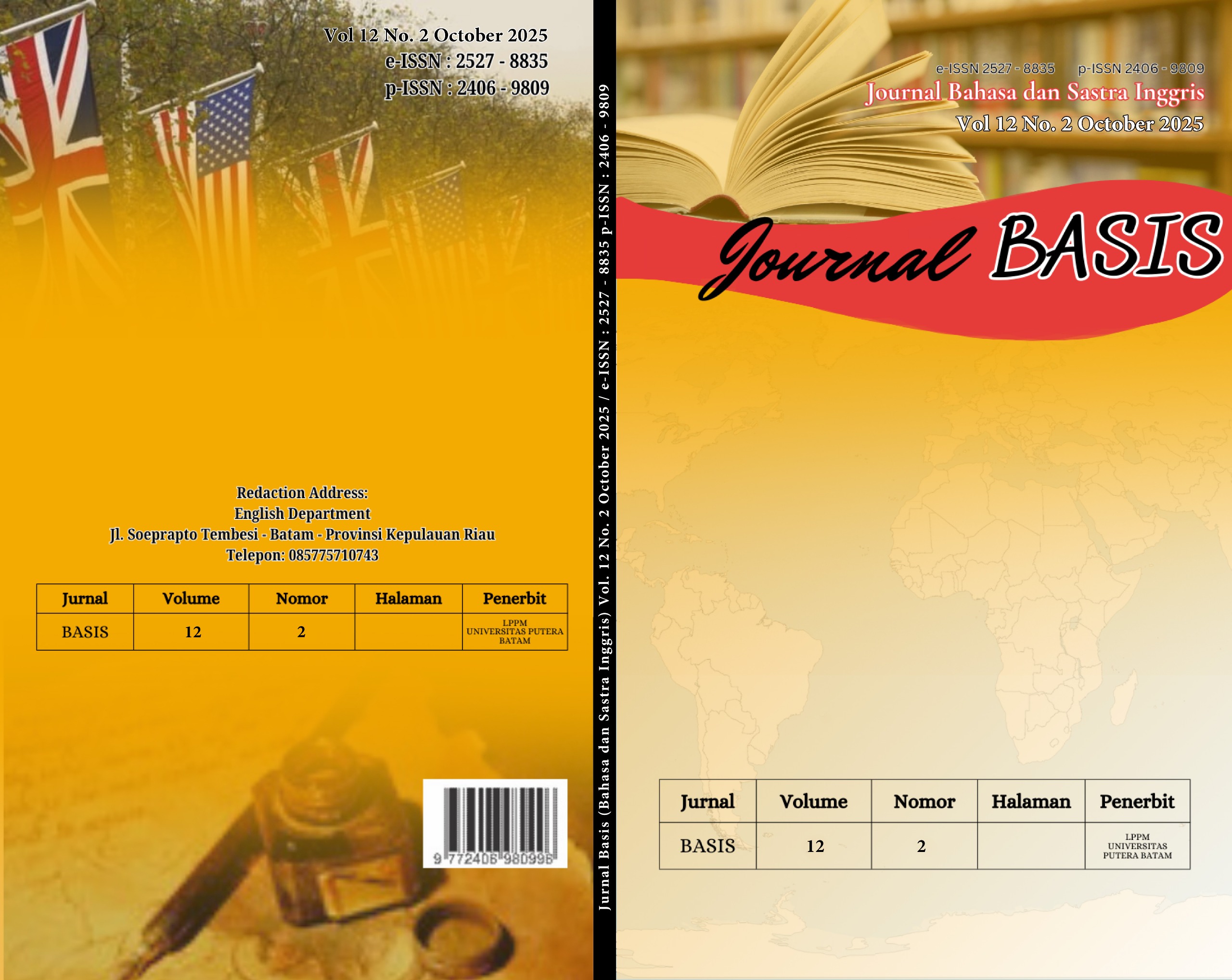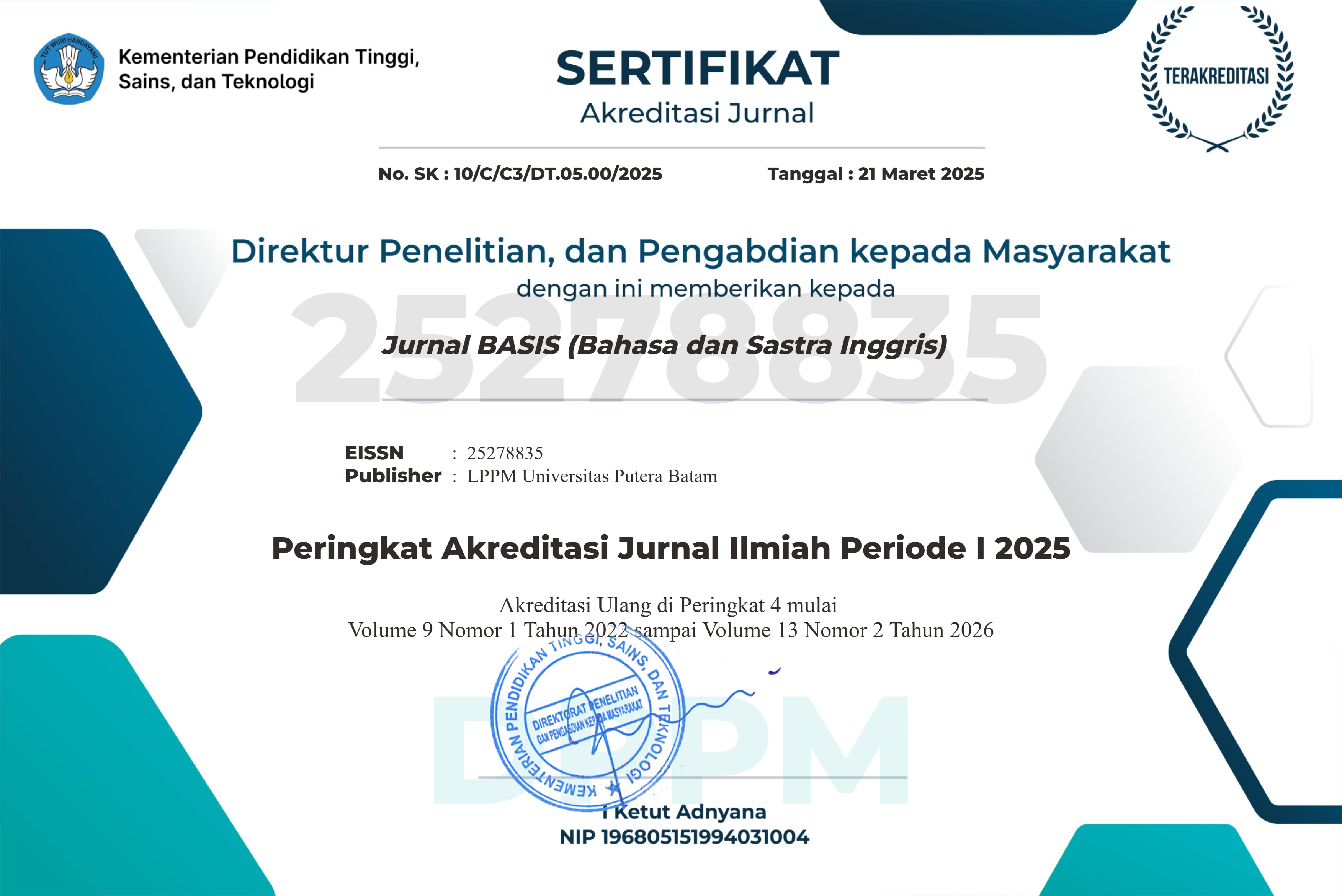WITH LOVE, YOURS TRULY: THE LANGUAGE OF SEDUCTION IN HENRY VIII’S LETTERS TO ANNE BOLEYN IN THE TUDORS SERIES
DOI:
https://doi.org/10.33884/basisupb.v12i2.9464Keywords:
Seductive Language, Rhetorical Strategies, Henry VIII, Anne Boleyn, The TudorsAbstract
This study examines the rhetorical strategies embedded in Henry VIII’s letters to Anne Boleyn as portrayed in the television series The Tudors. Drawing on Ballif’s seduction theory, which posits that persuasion intertwines rationality and emotional manipulation, the analysis identifies three key linguistic elements: affective, pompous, and ridiculous language. Using qualitative textual analysis paired with Spradley’s ethnographic coding techniques, the study investigates how Henry’s discourse oscillates between expressions of romantic devotion, performative grandiosity, and strategic dominance. The findings reveal that Henry’s letters employ emotional appeals, hyperbolic flattery, and rhetorical flourishes to simultaneously assert authority and court Anne’s favor. In contrast, Anne’s responses reflect caution and tactical modesty, underscoring her navigation of gendered power dynamics. The results demonstrate that seductive language in these exchanges blurs the boundaries between sincerity and manipulation, aligning with Ballif’s argument that rhetoric operates beyond binary distinctions of truth or falsehood. This study highlights the dual function of seduction as both an intimate gesture and a political instrument, offering fresh insights into the interplay of love, power, and persuasion in historical dramatizations.
References
Ballif, M. (2001). Rhetorical Philosophy and Theory. Board of Trustees, Southern Illinois University.
Betteridge, T. (2016). The Tudors and the Tudor Court: Know Your Symptom. In W. B. Robison (Ed.), History, Fiction, and The Tudors: Sex, Politics, Power, and Artistic License in the Showtime Television Series (pp. 195–207). New York: Palgrave Macmillan US. https://doi.org/10.1057/978-1-137-43883-6_12
Butler, J. P. (1990). Gender Trouble: Judith Butler Feminism and Subversion of Identity. London: Routledge. https://www.researchgate.net/publication/331968201_Gender_Trouble_Feminism_and_the_Subversion_of_Identity
Frunza, S. (2017). Seduction, Communication and Leadership. Transylvanian Review, (XXVI), 137–149.
Garcia, E. E. (1987). Freud’s seduction theory. The Psychoanalytic Study of the Child, 42, 443–468. https://doi.org/10.1080/00797308.1987.11823500
Israëls, H., & Schatzman, M. (1993). The seduction theory. History of Psychiatry, 4(13), 23–59. https://doi.org/10.1177/0957154X9300401302
Kesselring, K. J. (2016). Crime, Punishment, and Violence in The Tudors. In W. B. Robison (Ed.), History, Fiction, and The Tudors: Sex, Politics, Power, and Artistic License in the Showtime Television Series (pp. 235–247). New York: Palgrave Macmillan US. https://doi.org/10.1057/978-1-137-43883-6_15
Kuppens, P., Tuerlinckx, F., Russell, J. A., & Barrett, L. F. (2013). The relation between valence and arousal in subjective experience. Psychological Bulletin, 139(4), 917–940. https://doi.org/10.1037/a0030811
Levin, C., & Paranque, E. (2016). The Significance of the King’s Children in The Tudors. In W. B. Robison (Ed.), History, Fiction, and The Tudors: Sex, Politics, Power, and Artistic License in the Showtime Television Series (pp. 115–126). New York: Palgrave Macmillan US. https://doi.org/10.1057/978-1-137-43883-6_6
Mullin, R. (2019). ‘You Think You Know a Story’: Reframing the Tudors on Television in the Twenty-First Century. Adaptation, 12(2), 89–104. https://doi.org/10.1093/adaptation/apy006
Severin, W. J., & Tankard, J. W. (2001). Communication Theories: Origins, Methods, and Uses in the Mass Media Fifth Edition PARTI. New York: Addison Wesley Longman.
Weir, A. (2008). Henry VIII: King and Court. Vintage.
Wray, R. (2010). Henry’s Desperate Housewives: The Tudors, the Politics of Historiography, and the Beautiful Body of Jonathan Rhys Meyers. In G. C. Semenza (Ed.), The English Renaissance in Popular Culture: An Age for All Time (pp. 25–42). New York: Palgrave Macmillan US. https://doi.org/10.1057/9780230106444_2
Zéhenne, C. (2021). Practice-based Study Seduction Against Production: A Playful Way of Creating Knowledge. The Journal of Media Art Study and Theory, 2(1). Retrieved from www.mast-journal.org













 JURNAL BASIS (BAHASA DAN SASTRA INGGRIS)
JURNAL BASIS (BAHASA DAN SASTRA INGGRIS)
